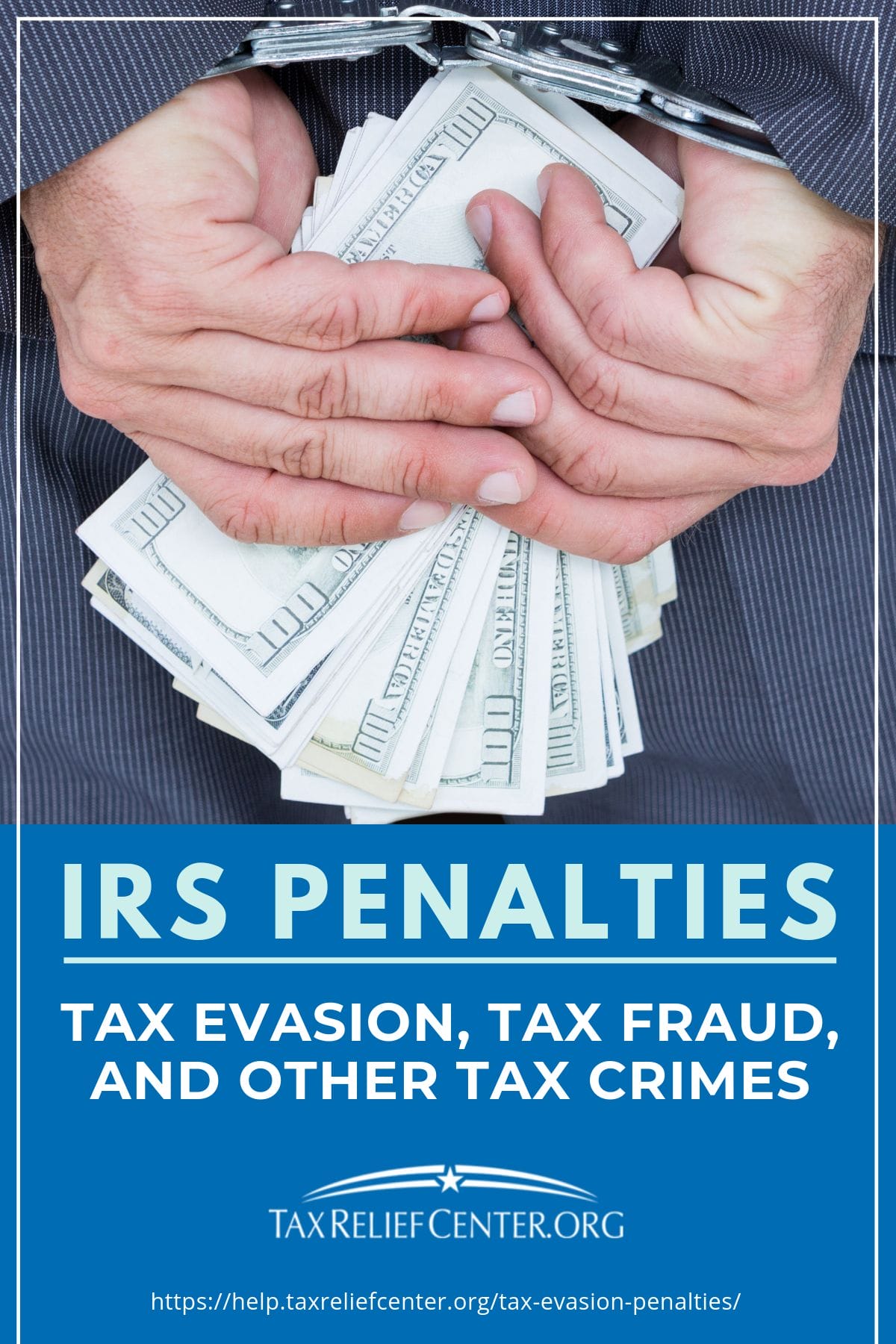Tax evasion penalties motivate taxpayers to dutifully pay taxes every year. To learn more about the serious legal consequences of evading taxes, read on.
RELATED: Can You Go To Prison For Not Paying Taxes?
In this article:
- Civil Penalties for Fraudulent Failure to File Taxes
- Criminal Penalties for Fraudulent Failure to File and Pay Taxes
- Tax Fraud Penalties
- Criminal Penalties
- Criminal and Civil Penalties for Intentional Non-Disclosure of Offshore Bank Accounts
Tax Evasion Penalties: Motivations for Paying Taxes Dutifully and Honestly
Tax Avoidance vs. Evasion
To have a good understanding of tax evasion penalties, it’s important to make a distinction between tax evasion and tax avoidance. These are two different tax-related acts.
- Tax avoidance is when a taxpayer uses legal means to reduce one’s taxable income and or tax liabilities. For example, contributions to a Traditional IRA are considered tax-deductible expenses that reduce taxable income and tax liabilities.
- Tax evasion involves illegal means to hide taxable income and information from the IRS. An example of this is not issuing official receipts to customers and not recording such sales as revenues.
Deception is the primary element that distinguishes tax avoidance from evasion. Tax evasion involves deceiving the IRS and other tax authorities by lying about or hiding actual income.
The following are tax evasion penalties the IRS imposes on tax-evaders.
1. Civil Penalties for Fraudulent Failure to File Taxes
Failing to pay taxes due to negligence requires the payment of a 5% penalty every month on the amount owed, but the civil penalty for fraudulent non-filing of taxes is much, much steeper.
A taxpayer has to pay a 15% penalty on the amount owed every month, with a maximum of 75% in the total penalty, if:
- He or she did not file a tax return or filed it after more than 60 days past the deadline; and
- If the IRS establishes fraudulent intent to evade taxes by not filing or filing a tax return very late.
In the event that the IRS imposes fraudulent failure to file and pay penalties on a taxpayer within the same month, the second penalty is cut by 0.5%.
The IRS bears the burden of having to prove that a taxpayer fraudulently didn’t file a tax return. That’s why this type of tax evasion penalties isn’t frequently imposed on taxpayers.
The IRS only imposes this penalty when the taxpayer:
- is not able to justify or refuses to justify the failure to file tax returns
- has a history of non-filing or very late filing
- justification for none or late-filing isn’t consistent with the case’s facts
- is aware of the filing requirements
2. Criminal Penalties for Fraudulent Failure to File and Pay Taxes

The IRS considers both as misdemeanors. In most cases, it only levies civil penalties and not criminal penalties.
Taxpayers who commit this act run the risk of paying criminal penalties up to $25,000 and staying behind bars up to one year. There’s a way to avoid criminal penalties, at least for failing to file tax returns.
When a taxpayer files the overdue tax return before the IRS gets in touch with him or her on the matter, that taxpayer can avoid criminal penalties.
Why? It’s because the key distinction between tax evasion and tax avoidance is the willful intent to illegally evade taxes.
When such a taxpayer files before the IRS contacts him or her, the taxpayer shows intent to file tax returns. This makes it hard for the IRS to prove that a taxpayer doesn’t intend to file the tax returns in question.
RELATED: 9 Tax Records You Should Keep In Your Business To Avoid IRS Audit
3. Tax Fraud Penalties
When an IRS audit shows a taxpayer intentionally omitted or under-reported income to reduce taxes, that’s very bad news. That taxpayer will pay a 75% penalty on the amount of tax payment deficiency resulting from the omissions or under-reporting.
The IRS only applies the 75% penalty on filed tax returns. It also needs to establish the taxpayer’s intentional and deliberate attempt to evade taxes through fraudulent reporting of income.
The IRS typically considers the following as evidence of fraudulent reporting of income for taxation purposes:
- Filing for unqualified tax deductions
- Intentionally not keeping accounting or financial records
- Using a fake Social Security Number
- Lying to IRS agents while being audited or investigated
- Using cash exclusively in transactions to hide income
- Maintaining two different books of accounts
- Omission or hiding or assets or income
- Tampering or destroying of financial evidence like official receipts, books of accounts, etc.
- Using trusts, shell accounts, and offshore companies to conceal income
In cases where fraudulent tax underpayment is limited to a portion of the entire estimated tax underpayment, the IRS presumes that the entire underpayment amount is fraudulent. The taxpayer concerned has the burden to prove otherwise.
When the IRS penalizes a taxpayer for tax fraud, it doesn’t add any more fraud-related penalties. But the IRS can still penalize any part of a tax deficiency that’s not due to fraud because of inaccuracy.
4. Criminal Penalties

Tax evasion is a very serious offense, i.e., a criminal felony.
It involves the intentional use of illegal ways to hide taxable income or assets or to distort actual financial details to reduce or avoid taxes. This is not the same as filing a fraudulent tax return, which carries a much lighter penalty.
If found guilty, a taxpayer can end up behind bars for up to five years and pay up to $100,000.
5. Criminal and Civil Penalties for Intentional Non-Disclosure of Offshore Bank Accounts
A taxpayer who intentionally hides offshore bank accounts from the IRS may face up to five years behind bars. That taxpayer may also have to pay either $124,588 per annual violation or up to 50% of the offshore accounts’ balances during the time of the violation.
Tax evasion is a very serious matter that can get any taxpayer in a lot of legal trouble with the Federal government. By becoming aware of the IRS’ tax evasion penalties, taxpayers have more compelling reasons to file and pay their taxes dutifully every year.
Do you think that the penalties the IRS imposes on tax evaders, intentional or accidental, are good enough reasons to keep people from even considering evading taxes? Share your insights below!
If you owe back taxes, visit taxreliefcenter.org for more information on tax relief options.
Up Next:
- Late Tax Filing: Fees & Tips for Filing Late Tax Returns
- How To Deal With The IRS And Your Small Business Tax Debts
- How To Stop, Remove Or Prevent A Bank Levy


